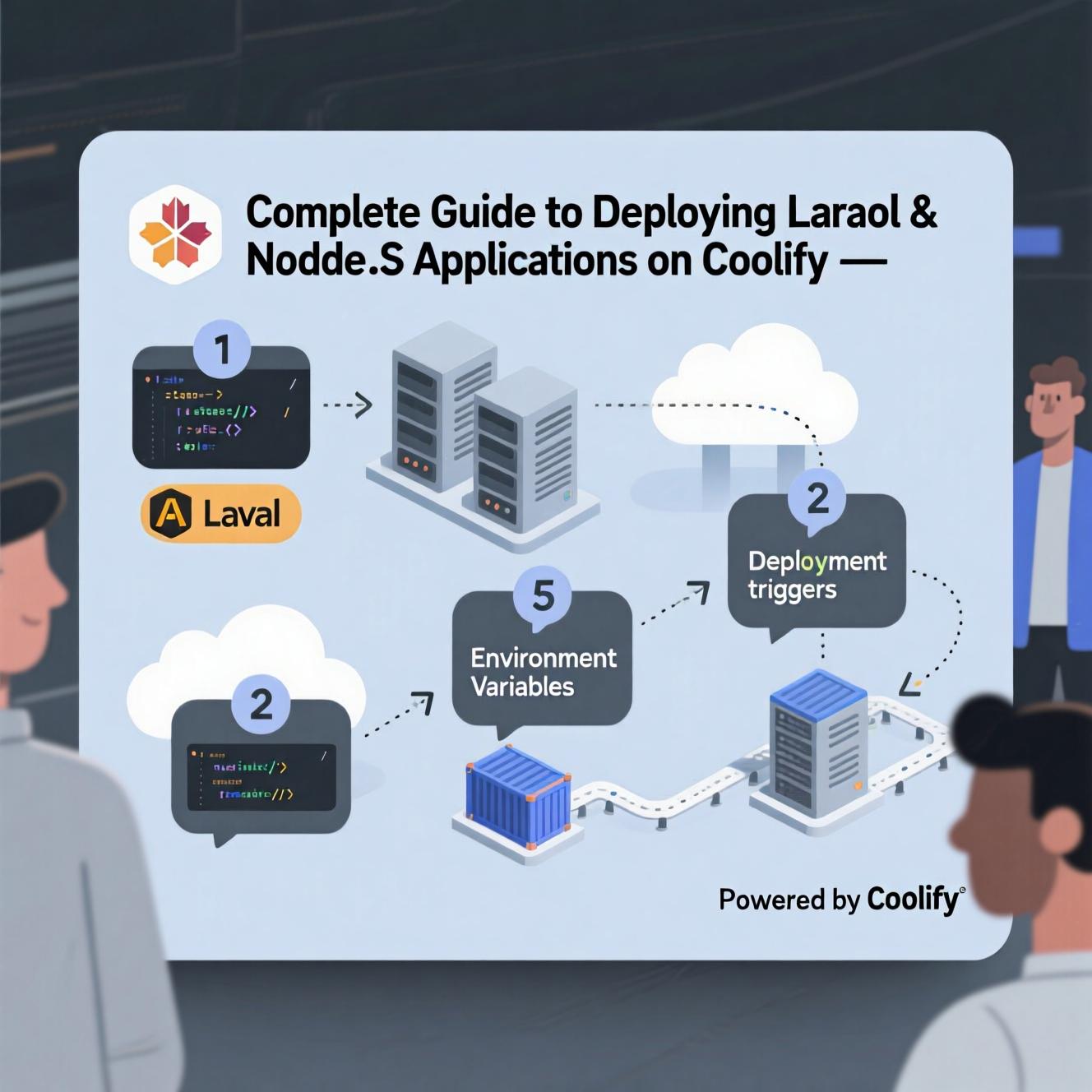Complete Guide to Deploying Laravel & Node.js Applications on Coolify
Deploying modern web applications like Laravel (PHP framework) and Node.js/Express has always been a challenge for developers who want speed, flexibility, and cost-efficiency. Traditional shared hosting often fails when projects grow, while managed hosting is expensive.
Here comes Coolify: an open-source, self-hosted PaaS (Platform as a Service) that makes deployment easy without deep DevOps skills. In this guide, we’ll explore how to deploy Laravel and Node.js applications on Coolify, integrate CI/CD pipelines, and optimize your setup for performance, security, and scalability.

Why Choose Coolify?
Coolify combines the simplicity of a hosting platform with the flexibility of Docker containers.
Key Benefits:
Easy Deployment: Simple UI for deploying apps.
Container-based: Built on Docker for resource efficiency.
Framework Support: Works smoothly with Laravel, Node.js, Express, Next.js, and more.
CI/CD Integration: Connect GitHub/GitLab for automated deployments.
Cost-Effective: Run apps on a cheap VPS ($5–$10/month).
Customizable & Secure: Manage servers with full control.
Step 1: Setting Up Coolify
1. Rent a VPS (e.g., Hetzner, DigitalOcean, Vultr, Time4VPS).
2. Install Docker and Docker Compose.
3. Run Coolify setup script:
curl -fsSL https://cdn.coollabs.io/coolify/install.sh | bash
4. Access Coolify dashboard via your VPS IP address.
???? In less than 10 minutes, you’ll have your own PaaS running.
Step 2: Deploying a Laravel Application
Preparing Your Laravel App
Ensure .env file has correct DB & APP settings.
Use SQLite/MySQL/PostgreSQL depending on project.
Run php artisan config:cache to optimize configs.
Deployment Process on Coolify
1. Connect GitHub repo with Laravel code.
2. Select PHP + Composer + Nginx + MySQL stack.
3. Add build commands:
composer install --optimize-autoloader --no-dev
php artisan migrate --force
php artisan config:cache
php artisan route:cache
4. Add environment variables inside Coolify.
5. Deploy.
✅ Your Laravel app is now running inside containers with better performance than shared hosting.
Step 3: Deploying a Node.js (Express/Next.js) App
Preparing Your Node.js Project
Ensure package.json has correct start script:
"scripts": {
"start": "node server.js"
}
Deployment Process
1. Connect Git repo.
2. Choose Node.js runtime from Coolify.
3. Add build commands:
npm install --production
npm run build # for Next.js
npm start
4. Expose port (default: 3000).
5. Deploy.
???? Node.js + Express apps scale easily with Docker, and Coolify ensures container isolation.
---
Step 4: CI/CD Integration (GitHub & GitLab)
Coolify supports automatic deployments whenever you push code.
Connect GitHub/GitLab repo to Coolify.
Enable auto-deploy.
Every commit to main triggers a fresh build + deployment.
This ensures a smooth DevOps pipeline without extra tools.
Step 5: Scaling & Load Balancing
Coolify allows:
Horizontal scaling (multiple containers).
Load balancing via Traefik reverse proxy.
Easy upgrades to larger VPS when traffic grows.
Example: A Laravel + Node.js stack can handle thousands of requests/sec with minimal downtime.
Step 6: Security Best Practices
Always use HTTPS with Let’s Encrypt SSL (built-in with Coolify).
Use separate databases for staging & production.
Regularly update dependencies with composer update or npm audit fix.
Limit root access on your VPS.
Step 7: Monitoring & Logs
Coolify provides:
Real-time logs per container.
Metrics for CPU, RAM, disk usage.
Alerts for failed deployments.
This helps developers troubleshoot quickly and keep apps stable.
Pros and Cons of Coolify
✅ Pros
Faster deployments than manual Docker setups.
Cheaper than managed hosting.
Supports multiple frameworks (Laravel, Node.js, Next.js).
Integrated CI/CD and SSL.
❌ Cons
Requires VPS knowledge.
Still new compared to Heroku/Render.
Limited enterprise support.
Conclusion
Coolify makes it easy, affordable, and powerful to deploy Laravel and Node.js apps without needing full DevOps skills.
For Laravel developers: Faster performance, optimized queue management, and lower costs.
For Node.js developers: Seamless scaling, container isolation, and CI/CD automation.
For businesses: More control, flexibility, and budget-friendly hosting.
???? If you want the power of Docker without the complexity, Coolify is one of the best modern hosting solutions in 2025.
زرونا علي موقعنا
او تواصل مع الرقم 01001197157